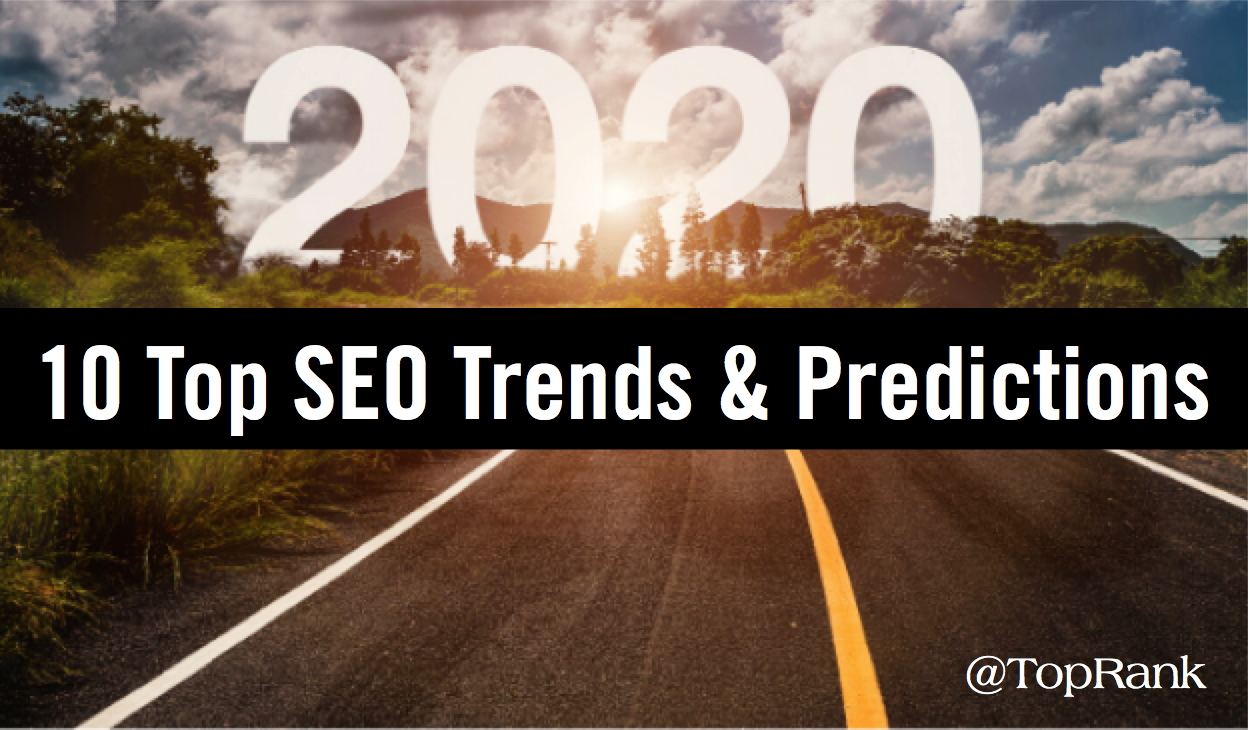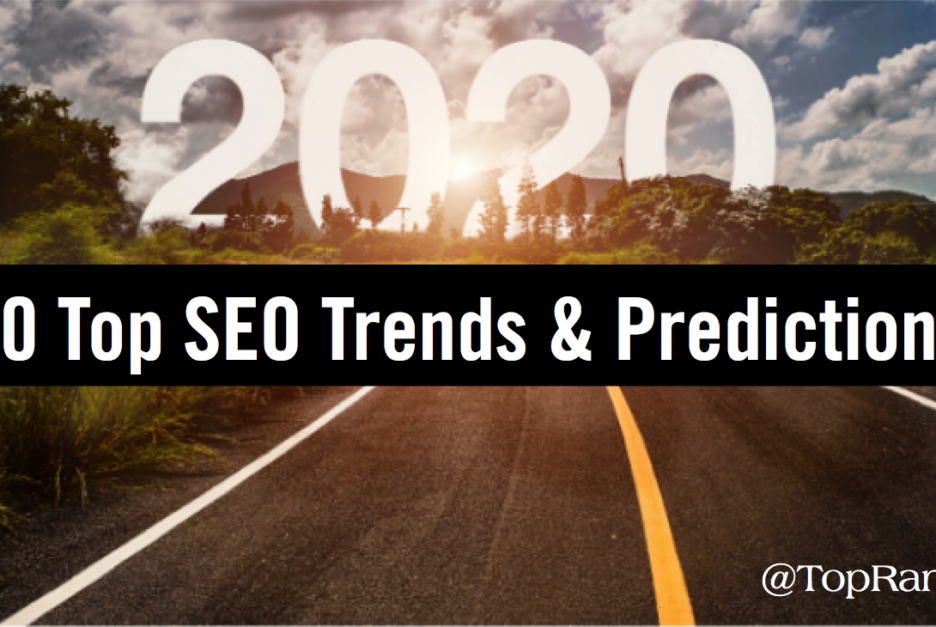
It’s that time of year, B2B marketers. We’re tying up loose ends. We’re reflecting on a year’s worth of wins, opportunities, and change. And we’re working hard to finalize next year’s marketing plans and budgets so we can hit the ground running after the clock strikes midnight on New Year’s Day.
2019 was a wild year for search, keeping SEOs and marketers on their toes. Multiple mobile-first indexing updates were implemented by Google. New best practices were released for structured data. Automated podcast transcription and playability within Google SERPs became a reality. And the list goes on.
As we say goodbye to another year and decade of massive changes, we asked our SEO-savvy friends to join us in sharing trends to watch and predictions for what 2020 will bring to the world of search. What topped the list?
From voice search and IoT to intent research and structured data—it’s clear that the future of search is more user-focused than ever before: Providing the best answer, in the best format, wherever and whenever a query is made.
TopRank’s Take: SEO in 2020
Competition for organic search visibility will continue to grow and be a focus for marketers in 2020. But while smart and balanced on-page SEO tactics will remain a must, as content continues to proliferate and search engine algorithms advance, expansion, integration, and creating better experiences will be critical ingredients for success.
#1 – A Focus on Credible Content to Create Best-Answer Experiences

Lee Odden @leeodden
CEO, TopRank Marketing
Content optimization for improved search visibility is no longer enough. Not for Google, not for brands and certainly not for buyers looking for the best answer to their questions. Content in 2020 must be more than relevant and helpful. It needs to be credible and serve as part of an experience that differentiates those brands that deserve top visibility and those that lag.
To do that, marketers will need to elevate their skills at optimizing content for findability, credibility, and experience. When marketers see more strategically how SEO can integrate with content marketing and influencer marketing to create a better customer experience, everybody wins.
Content in 2020 must be more than relevant and helpful. It needs to be credible and serve as part of an experience that differentiates those brands that deserve top visibility and those that lag. @leeodden Click To Tweet#2 – Brands Go Off-Page to Build Awareness and Authority

Tiffani Allen @Tiffani_Allen
Associate Director of Search and Analytics, TopRank Marketing
We see competition for organic visibility growing fiercer. While smart and balanced on-page SEO tactics will remain a must, as content continues to proliferate and search engine algorithms advance, expansion and integration will be critical.
What does this mean? Creating high-quality content that’s optimized for the modern searcher (and algorithms) is the minimum. But with brand building and demand generation— especially for the growing portfolio of B2B tech brands, being paramount—I predict SEO will become more ingrained in B2B brand building initiatives. More specifically, I predict we’ll see a rise in brands leveraging off-page factors to increase brand awareness and build authority, with link building—especially around unlinked brand mentions—becoming a pivotal focus area.
I predict SEO will become more ingrained in brand building initiatives. More specifically, I predict we’ll see a rise in brands leveraging off-page factors to increase brand awareness and build authority. @Tiffani_Allen Click To TweetExperts’ Top SEO Predictions and Trends to Watch in 2020
#3 – Delivering Anytime, Anywhere Thanks to Voice Search and IoT Devices

Barry Schwartz @rustybrick
President, RustyBrick; Executive Editor, Search Engine Roundtable; and News Editor, Search Engine Land
I’m still gung-ho about voice search. It is super exciting to see the advancements there—also the smart displays for voice assistants, that is going to be a lot of fun. Looking back at how much easier it is to do voice queries now, and how my kids even do it, it’s becoming so natural for people. We are on the verge of this really exploding and it’s grown so much, so fast already.
I’m also watching the growth of search with embedded devices, not just from voice appliances and smart displays, but even more: in your cars, refrigerators, ovens, your clock or speakers, etc. Heck, integrating all of that with your light switches and internet of things (IoT) devices, it’s super exciting to watch.
We also have video features in YouTube and beyond, audio features with podcasts, and even image features with 3D and augmented reality (AR) images. There’s also Bing’s move to get publishers to push content and to see if Google will expand their indexing API.
In summary, search has come so far in understanding natural queries via voice. In 2020, we’ll be able to show search results anywhere and anytime—and I’m looking forward to that.
Search has come so far in understanding natural queries via voice. In 2020, we’ll be able to show search results anywhere and anytime—and I’m looking forward to that. @rustybrick Click To Tweet#4 – Closing the Gap Between SEO and Brand

Jono Alderson @jonoalderson
Digital Strategist, Marketing Technologist, Full Stack Developer, and Keynote Speaker; Special Ops, Yoast
It’ll become increasingly important to close the gap between SEO and brand. SEO experts will need to get better at collaborating with other teams to build integrated strategies, which work to improve the product-market fit.
If you’re not a good fit for the consumer, it won’t matter how many links you have, or how perfect your website is. Google’s intent was never to show a list of links, but rather, to provide the best solution for a user. If you’re not trying to be or become that solution, you’re not even going to show up.
Google's intent was never to show a list of links, but rather, to provide the best solution for a user. If you're not trying to be or become that solution, you're not even going to show up. @jonalderson Click To Tweet#5 – Raising the Stakes for Mobile SERP Visibility

Aleyda Solis @aleyda
International SEO Consultant & Founder, Orainti
A few SEO trends that I expect for 2020 are:
- The growth in importance and usage of structured data due to more rich results in mobile SERPs and usage to generate voice actions for the Google assistant.
- An increase prominence of predictive search features via Google Discover and additional integrations.
- A further shift to a more technical SEO ecosystem fueled by more JS frameworks usage from new sites, the growth of PWAs and need of SEO automation for bigger websites.
#6 – Creating Content for Search Intent by Topic, Rather Than Individual Keywords

Jesse McDonald @jesseseogeek
Global SEO Strategist, IBM
From an SEO-perspective, I see 2020 having a large focus on improving content creation by focusing on holistic topics instead of just singular keywords. This will force content to utilize more natural language that satisfies a user’s question instead of filling the page with fluff and marketing jargon. As Google continues to update its algorithm with updates like BERT, this focus will become even more important.
I see 2020 having a large focus on improving content creation by focusing on holistic topics instead of just singular keywords. @jesseseogeek Click To Tweet#7 – Automation = Freedom

Britney Muller @BritneyMuller
Senior SEO Scientist, Moz
My prediction for SEO in 2020 is that automated SEO insights will become more accessible, freeing us up to work on higher level thinking and strategy. In addition, incorporating QA markup and crafting content around intent and SERP features will continue to be important.
My prediction for SEO in 2020 is that automated SEO insights will become more accessible, freeing us up to work on higher level thinking and strategy. @BritneyMuller Click To Tweet#8 – SEO + CRO + Unique Brand Story = A Winning Combination

Ayat Shukairy @ayat
Co-Founder Managing Partner, Invesp
First, more convergence of SEO and CRO—this trend will be driven by three factors:
- Google’s continuous focus on user experience
- More companies and brands paying closer attention to conversion rates and how to increase sales
- SEOs trying to find new methods to drive more business
Second, brand stories will become more important. Most brands are copycats of each other. When it’s difficult to distinguish between brands, users will have very little brand loyalty. With Google changing the rules as it wishes, establishing a unique brand that attracts visitors away regardless to search becomes essential.
Third, we will see more SEO testing. A/B (split) testing is popular in experimentation programs, but it has not gained much traction amongst SEOs. Split testing site structure/content to see which version of the site generates more traffic is still in its infancy; however, it will gain more popularity as Google relies more on artificial intelligence (AI).
I see three major SEO trends in 2020: 1) More convergence of SEO and CRO, 2) Increased importance of brand stories, 3) A rise in SEO testing. @ayat Click To Tweet#9 – Semantic Markup and Schema Will Become Overpowering

Dixon Jones @Dixon_Jones
CEO, inLinks.net
The Google Webmaster Conference in Zurich left me with a couple very useful insights into 2020. The first is that Google intends to increase the amount of schema that they support. In fact, I predict semantic markup and schema will become overpowering in 2020—whether you are optimizing content, images or events—every SEO will need to understand schema and (I hope) use tools like inLinks to help make that happen.
My second prediction is that Google will start to extend their “rel=” attribute in links. They currently support rel=nofollow, rel=ugc, and rel=sponsored, but my prediction is that this will be the start of Google trying to get more information from links. I might be wrong—but what is crystal ball gazing for?
I predict semantic markup and schema will become overpowering in 2020—whether you are optimizing content, images or events—every SEO will need to understand schema. @Dixon_Jones Click To Tweet#10 – Moving from Keyword Research to Intent Research

Hamlet Batista @hamletbatista
CEO, RankSense
BERT is just the tip of the iceberg on what is coming in terms of a better understanding of user intent. I foresee many SEOs moving away from traditional keyword research and doing more “intent research”. What are the yet unfulfilled intentions that clients can address with new engaging content?
While BERT helps a lot with understanding natural language, GPT2—a natural language generation algorithm—helps with generating compelling content.
I anticipate new Google and Bing guidelines to clarify good and bad uses of this type of powerful content generation technology. Many companies will race to scale their content efforts and produce business value.
Chrome is going to start shaming slow sites next year. You can expect page speed to be a big priority like HTTPS was for the last two years.
BERT is just the tip of the iceberg on what is coming in terms of a better understanding of user intent. I foresee many SEOs moving away from traditional keyword research and doing more ‘intent research’. @hamletbatista Click To TweetCheers to a New Decade of SEO
Big changes are ahead, which is cause for both celebration and critical thinking. A renewed and consistent focus on providing best-answer content, advancements in how we can automate day-to-day tasks, and the concept of voice search for the whole home could mean huge changes in the way SEOs and marketers interact with their teams, and the way consumers interact with brands.
If you’re unsure where to start in 2020, it can help to start with getting the lay of the land. For help, check out my tips for optimizing your B2B content performance with an SEO audit.
What are you SEO predictions for 2020? What SEO trends do you have your eye on? Tell us in the comments section below or tweet us at @toprank.



